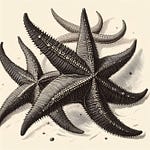Hi everyone!
This week, we give you episode three: “Violins and Violas.”
You can find a nice (not Substack-generated) transcript of episode 3, as well as a music-free remix, here.
In this week’s episode, Joanna and I speak with the psychology researcher Tobi Abubakare about the bewildering history of psychology research connecting autism and theory of mind, as well as the harmful legacy of that research.
“Violins and Violas”
In the early 1980s, Simon Baron-Cohen, Uta Frith, and Alan Leslie conducted an experiment. They administered verbal false belief tests to a few autistic and non-autistic kids, and their results suggested that the autistic kids had a unique deficit in theory of mind. So they wrote up their results, and published a paper that would end up shaping autism research for decades.
But here’s the catch: those early experimental results couldn’t be reliably replicated. And instead of giving up on the “theory of mind deficit” view of autism, researchers decided to go looking for new ways of measuring theory of mind in order to vindicate the “theory of mind deficit” idea.
Tobi Abubakare (they/them), an autistic autism researcher and PhD candidate in clinical psychology, explains what caused those replication failures, why researchers clung to the “theory of mind deficit” view in spite of those failures, and how this type of research has affected autistic people. Plus, they have some important advice for researchers–with the help of a musical analogy.
Topics Discussed
Baron-Cohen, Frith, and Leslie’s paper, “Does the autistic child have theory of mind?” (00:31)
Why researchers got so excited about the “theory of mind deficit” view of autism. (03:11)
The failures to replicate Baron-Cohen et al.’s results, and the “methodological arms race” to develop new measures of theory of mind that would vindicate the theory of mind deficit view of autism. (06:27)
Tobi’s introduction. (09:40)
Tobi’s first explanation for those replication failures: small sample sizes. (11:26)
Tobi’s second explanation for those replication failures: poorly characterized samples. (13:20)
Tobi’s explanation for why the theory of mind deficit view remained influential, in spite of those failures of replication: it confirmed what researchers already believed about autistic people. (16:48)
Value-laden assumptions in autism research, and in research on race. (18:55)
How scientists (including autism researchers) can end up performing “mental gymnastics” in order to hang on to their theories. (20:46)
The strange notion that autistic people who pass false belief tests are “cheating” on the tests. (21:33)
How the theory of mind deficit view of autism causes real-world harm. (23:13)
Tobi’s story about how the “theory of mind deficit” view of autism has impacted them personally. (23:54)
How the “theory of mind deficit” view of autism shapes many of our everyday interactions. (29:18)
Tobi’s recommendations for researchers: when you’re looking for a difference, ask yourself why you’re looking for that difference, and then interrogate your assumptions about that difference. (30:41)
Sources Mentioned
Simon Baron-Cohen, Uta Frith, and Alan Leslie, “Does the autistic child have theory of mind?” Cognition, Vol. 21, Issue 1 (1985), 36-47. https://docs.autismresearchcentre.com/papers/1985_BC_etal_ASChildTheoryOfMind.pdf
DSM-III (The American Psychiatric Association, 1980). https://aditpsiquiatriaypsicologia.es/images/CLASIFICACION%20DE%20ENFERMEDADES/DSM-III.pdf
Morton Ann Gernsbacher and M. Remi Yergeau, “Empirical Failures of the Claim that Autistic People Lack a Theory of Mind,” Archives of Scientific Psychology, Vol. 7, Issue 1 (2019), 102–118. https://psycnet.apa.org/fulltext/2019-75285-001.html
Oluwatobi Abubakare, “An Unexpected Autistic,” Autism in Adulthood, Vol. 4, No. 4 (2022). https://www.liebertpub.com/doi/abs/10.1089/aut.2022.0004
Press release about the first in-person meeting of the Black Empowerment in Autism Network (BEAM): https://ed.unc.edu/2023/06/15/creating-new-momentum-in-autism-research/
Credits
Hosting, Research, Fact-Checking, Script-Editing: Amelia Hicks and Joanna Lawson
Guest: Oluwatobi “Tobi” Abubakare
Music and Audio Production: Amelia Hicks
Additional Voicework: Rach Cosker-Rowland
Thank-Yous
Another thank you to Rach Cosker-Rowland for lending us her voice to read some pieces of text for us! We’re also grateful for her editorial advice.
Many thanks to Tobi Abubakare for speaking with us about the (very confusing) history of theory of mind deficit research. Tobi has been incredibly generous with their time and knowledge, and we’re very grateful to them for helping us understand this piece of the history of autism science. You can read more about Tobi’s experiences and how those experiences shape their approach to autism research in their recently published paper, “An Unexpected Autistic.”
And thanks to the Marc Sanders Foundation and the Templeton Foundation for their support of the show.












Share this post